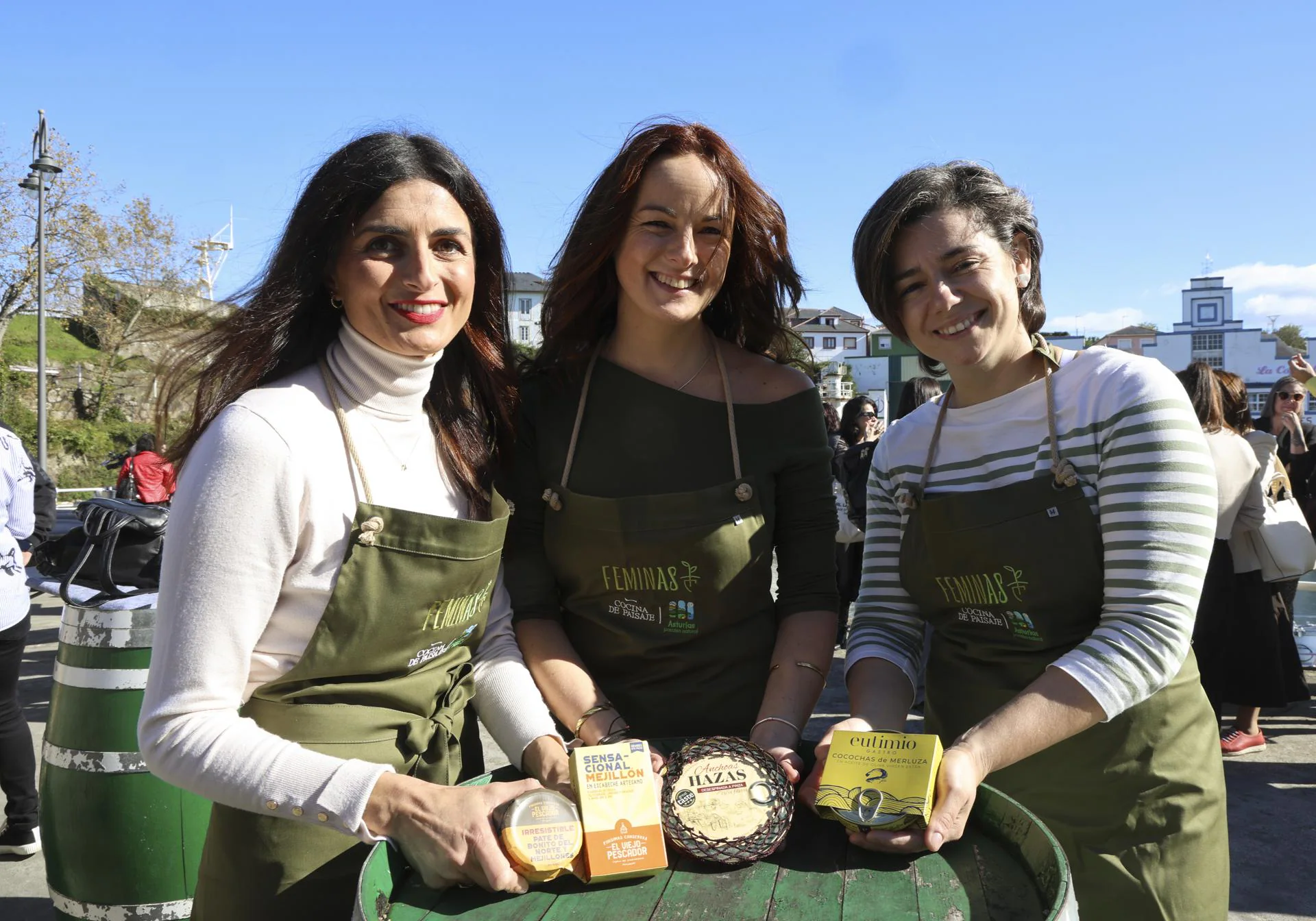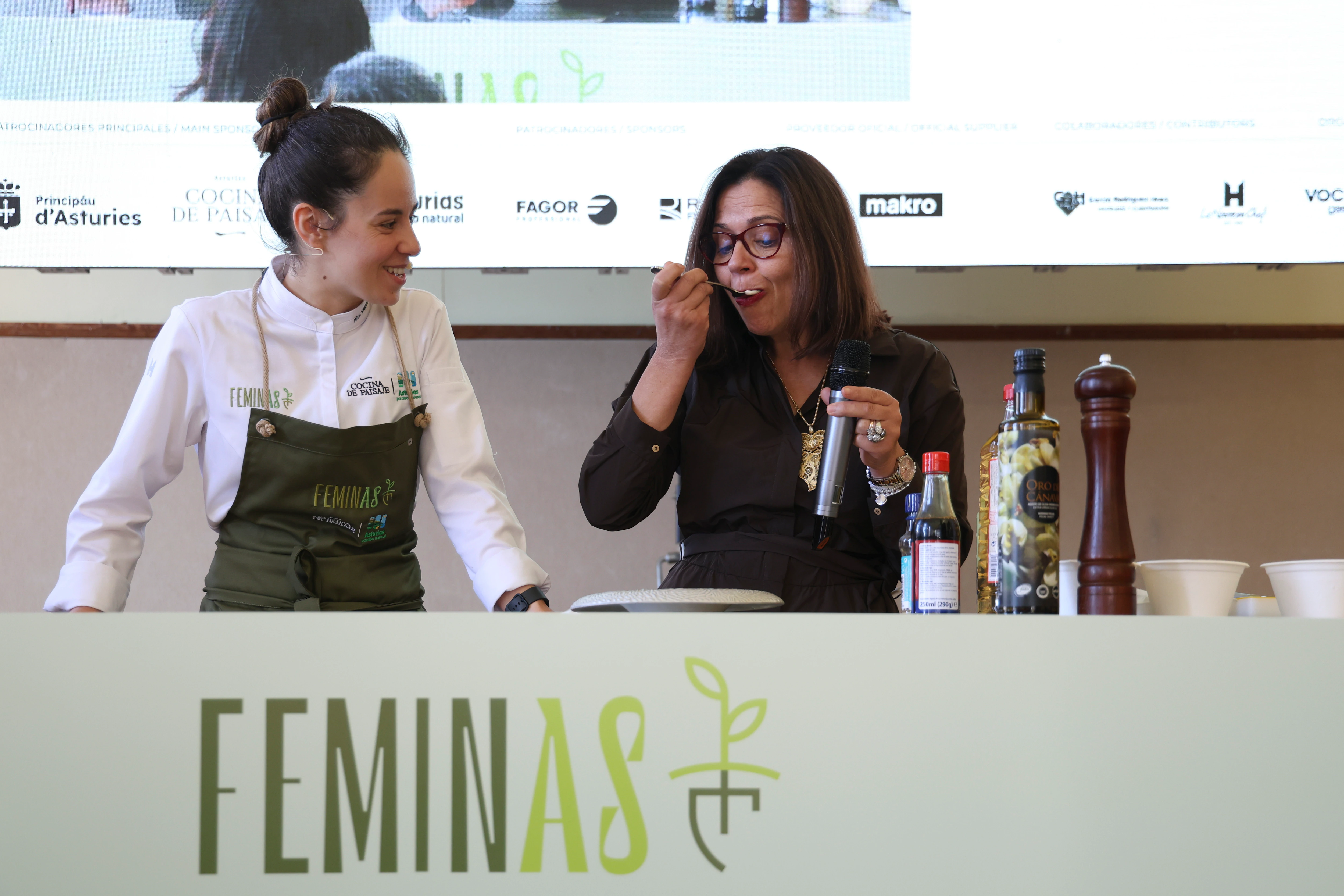"Author cuisine would not be possible without the work of generations of anonymous women"
Lucía Freitas, Chiara Pavan, Rita Magro, and Noelia Jerónimo honor rural cooks in a FéminAS edition that awards the matriarchs of Portuguese cuisine
Guillermo Elejabeitia
Luarca
Tuesday, 29 October 2024, 20:55
It may sound obvious, but sometimes it is necessary to express what seems evident to become aware of it. "Author cuisine, which generally bears a man's name, would not be possible without the work of generations of women who remained anonymous," recalled chef Lucía Freitas on the stage of FeminAS, the congress of gastronomy, women, and demographic challenge held these days in Western Asturias. Freitas, one of the most inspired voices of the new Galician cuisine, starred alongside young professionals like Portuguese Rita Magro or Venetian Chiara Pavan in the second day of a meeting that recognizes with the Guardians of Tradition award the work of hundreds of popular cooks collected in the documentary series 'Portuguese cuisine likes itself', directed by Tiago Pereira.
Inspired by a stew offered by a village lady during a filming, the documentarian and musical ethnographer realized the vast material that rural cooks in his country could offer. In the following years, Pereira dedicated himself to interviewing women like Luisa Simoes, Fernanda Martins, Belmira Lopes, or Leontina Moreira, who never dreamed of seeing their names in cinema or television, while they prepared some of the recipes they had learned from their mothers and grandmothers. The result is a series of documentaries that helps to fix a cultural heritage of incalculable value, but at risk of extinction with the leap to the next generation. Representing those hundreds of anonymous cooks, the probably most famous and beloved chef in Portugal, Noelia Jerónimo, received the congress award.

Both Noelia, a judge in the Portuguese edition of Masterchef, and her compatriot Rita Magro, named the best young chef in Portugal at the last Michelin gala, wanted to remember in their speeches the women who laid the foundations of their country's traditional cuisine so that they could elevate it with contemporary techniques. Rita, born in Coimbra and based in Porto, recalled the example of her grandparents, who worked the land in a small village and have become one of her great professional inspirations. She now leads the kitchen of the starred Blind, inspired by José Saramago's "Blindness", where she invites diners to face the dishes blindly, to better appreciate the intensity of the flavors. She presented a raw fish escabeche that evoked her grandparents' countryside snack in a sophisticated key.
Talent in preservation
The return to ancestral values as a response to the challenges posed by the future also hovered over the presentation of Italian Chiara Pavan. Her restaurant Venissa, awarded a Michelin star and a green star for sustainability, is located north of the Venice Lagoon, "one of the hotspots for measuring the impact of climate change". In the nine years she has been working there, she has seen the land salinize due to persistent drought, floods become more frequent and severe, and biodiversity lost, giving way to invasive species like the blue crab. Her response is to bet on local consumption from her own garden and a network of nearby small producers practicing regenerative agriculture, fight against waste through ancient preservation techniques, reduce animal protein consumption in a menu where vegetables are the main protagonists, and also eat those invasive species that devour native fauna.
"But I refuse to see those animals as enemies to fight against; if blame is to be distributed, it is generally ours," Pavan clarified. An attitude of listening and symbiosis with Nature exemplified by shellfish gatherer Patricia Villar, winemaker Esther Teijeiro, pioneer of the Ribeira Sacra designation of origin, and many other women whom Lucía Freitas pays tribute to in her documentary project Amas da Terra. "They do very hard work and there is a lack of generational replacement; if we overshadow their work, there will be no future." The day ended with a tasting of marine preserves held in Puerto de Vega by María Busta, from Casa Eutimio, Ángela Donato, from El Viejo Pescador, and Ana Labad Cruz, from Anchoas Hazas. The three represent the present of a sector where women have always played an important role in the groundwork, but where men were the ones who led the industry.




